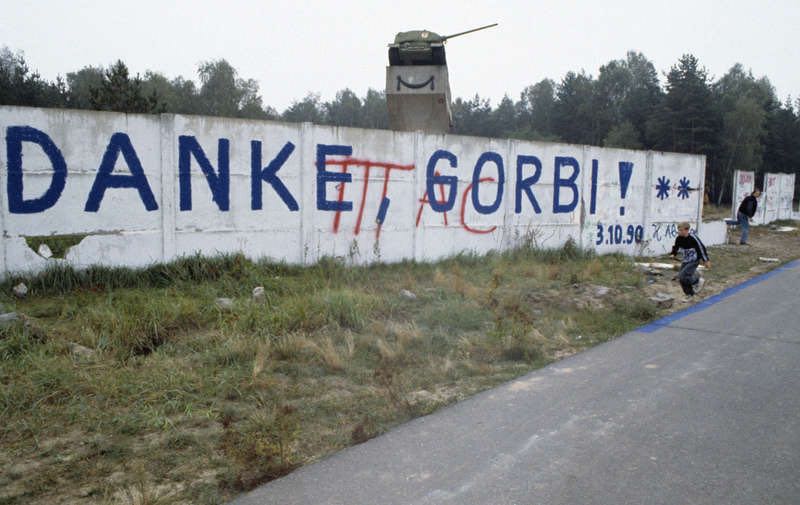Russians’ attitudes to the fall of the Berlin Wall are largely positive — at least among those who still understand what it was. But historical knowledge is dwindling and is being replaced with mythology. We should never forget, however, the benefits Germany's reunification brought to the world, writes Andrei Kolesnikov of the Carnegie Moscow Center.
by Andrei Kolesnikov
A month before the fall of the Berlin Wall, Soviet leader Mikhail Gorbachev visited East Germany. The diaries of his advisor Anatoly Chernyaev provide a crucial historic record of the scenes:
'The crowds chant ‘Gorby! Gorby!’ and no one is paying any attention to [East German leader] Erich (Honecker). At the rallies, people hold up posters in Russian that read: ‘Gorbachev, you are our hope.’'
Nowadays, it’s hard to imagine the unprecedented scope of 'Gorba-mania' at the time, or a situation in which the leader of one country is exponentially more popular abroad than at home.
 Graffiti on the wall that had separated Germany till October 3, 1990. Photo Wikimedia Commons
Graffiti on the wall that had separated Germany till October 3, 1990. Photo Wikimedia Commons
Chernyaev explained the phenomenon well: 'At the time, we didn’t comprehend, and we couldn’t comprehend, the terror with which Europe viewed our military might, our 1968 [invasion of Czechoslovakia] and our [war in] Afghanistan, nor the shock felt by Europeans after the installation of the SS-20 [ballistic missiles]. We didn’t want to know anything about it, as we were busy showcasing the might of socialism. It was Gorby who took away that terror.'
Pessimistic views
Thirty years after the fall of the Berlin Wall, it’s common to have pessimistic views. Europe is divided, populists are on the march, there is an influx of migrants, the European project is tearing at the seams, relations with the U.S. are terrible and with Russia they’re even worse, Ostalgia (nostalgia for life in Communist Germany) is growing and eastern German regions are voting for the right-wing Alternative for Germany political party. 'The end of history' is nowhere to be seen.
But as with all generalizations, this view oversimplifies the reality.
Germany’s reunification has brought a dramatic rise in prosperity in the country, both in terms of raw numbers and based on perceptions measured in polls. Before the wall came down, the salaries of East Germans were 37% of those in West Germany, and the GDP per capita was only 33%.
The process of reunification was undoubtedly difficult and costly, but when it comes to changes in life satisfaction, Germany outperforms most other countries, including those in Eastern Europe. According to an August 2019 survey by the Pew Research Center, life satisfaction rose to 64% in western Germany in 2019, up from 52% in 1991, while in eastern Germany, it rose to 59% from 15% over the same time period.
This trend was recorded across the board, including in attitudes to democracy, human rights, and multiparty political systems. This happened despite the lasting influence of the socialist past — with support for the Alternative for Germany twice as high in eastern regions as in western regions (24% vs. 12%).
Other countries that recorded high levels of satisfaction similar to Germany’s included Poland (but not Hungary, despite its nearly identical right-wing populist government) and the Czech Republic.
Meanwhile, if we set aside Russia and Ukraine, Bulgaria is the Eastern Bloc country that is most disappointed with 'the end of history in 1991' (in reality, 1989).
Europe is the sole successful project of the collective West — largely thanks to the new perceptions of reality that formed after 1989 and the attractiveness of anchor projects like the EU, NATO, and the OECD.
Russia has built a virtual wall
Viktor Orban may hug Vladimir Putin for photo-ops, but he cannot step off the European path without bringing catastrophic repercussions for his country. Meanwhile, Russia has been left on the sidelines of Europe, having built a virtual wall in place of a physical one.
In Germany, 65% of respondents say they are satisfied with democracy compared to 30% in Russia, according to the same Pew survey. Life satisfaction stands at 28% in Russia, placing it second to last in the list, just ahead of Ukraine. We are 31 percentage points behind east Germans in this respect.
Meanwhile, Russians’ attitudes to the fall of the Berlin Wall are largely positive — at least among those who still understand what it was. This response was recorded both in a 2009 survey by the independent Levada Center pollster in 2009 and a 2014 poll by the state-run Foundation of Public Opinion (FOM).
But historical knowledge is dwindling and is being replaced with mythology, as one of the greatest events in the history of humankind is becoming distant for Russians. They are increasingly struggling to answer when asked about the significance of the event.
Only 5% of Russians say they are proud of perestroika and the beginning of market reforms (according to 2018 data), though 24% of our compatriots also say they are ashamed of Russia’s chronic gap in development when compared to the West.
The Russian soul is full of contradictions and hides not one, but many walls of its own making.
This article was first published in The Moscow Times
